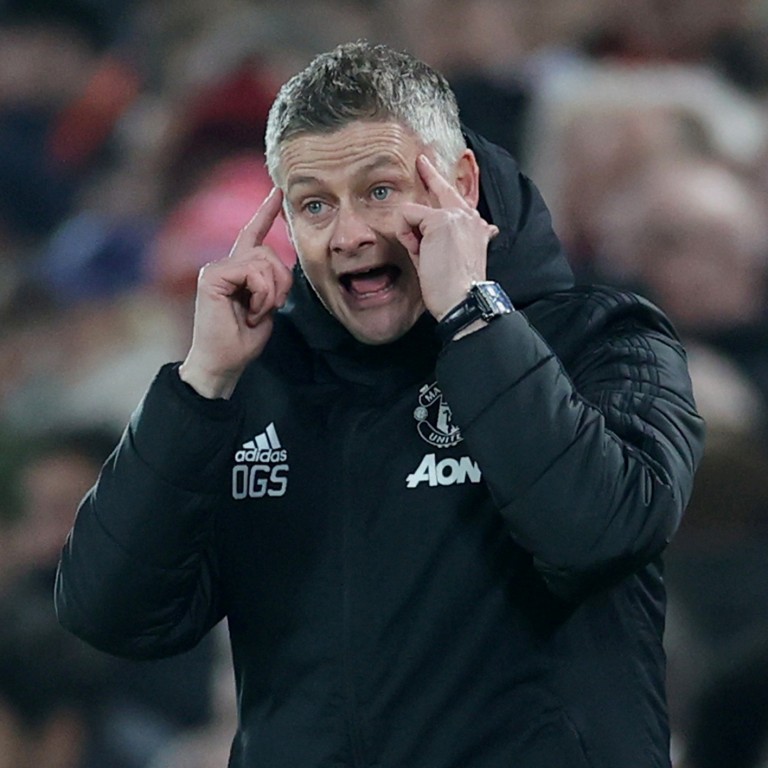
Ole Gunnar Solskjaer takes Alex Ferguson’s lead with bizarre ‘long ball’ Liverpool jibes, but they don’t stand up to scrutiny
- Man United manager Solskjaer called Klopp’s side ‘the most direct team in the league’
- The Norwegian’s side suffered two 0-2 defeats in a week, the second – at home to Burnley
Ole Gunnar Solskjaer is losing games and the Manchester United dressing room. If results like this week’s back-to-back 2-0 defeats by Liverpool and Burnley continue, he will surely lose his job. He certainly appears to have lost his critical faculties.
The United manager’s comments after his team were shown up at Anfield were bizarre. Solskjaer talked about the home side’s “long ball” game and called Jurgen Klopp’s side “the most direct team in the league.” The implication was clear. It was a sly dig at Liverpool’s style of play.
Long-ball football is associated with the worst aspects of the English game. It evokes agricultural defenders who hoof the ball upfield to place opponents under aerial bombardment. This approach, known as “route one” was notoriously promoted in the 1980s by Charles Hughes, the director of coaching at the FA. It brings to mind thuggish, powerful forwards whose main role was to win headers and destabilise defensive players with physical contact. Solskjaer knew what images his words would summon up.
Bob Paisley, Liverpool most successful manager, laughed off the ideas espoused by Hughes. “It doesn’t matter whether it’s a long ball or a short ball as long as it’s the right ball,” said the man who won six league titles, three European Cups, a Uefa Cup and three League Cups in nine years in charge. Paisley would appreciate Klopp’s team.
Despite Solskjaer’s jibes, Liverpool’s methods are extremely sophisticated. Quick passes forward are not aimed at hulking big men but Mo Salah, Roberto Firmino and Sadio Mane, players whose pace and movement mean defenders are wary about leaving any space behind the back line. Many of the team’s lengthier passes are cross-field, from flank to flank, with Trent Alexander-Arnold and Andy Robertson adept at switching the point of attack in an instant. These are tactics designed to emphasise flair and control and keep rival teams on the back foot; it is far from the pub football suggested by Solskjaer’s dog-whistle.
For Solskjaer to disparage Liverpool’s excellence when he was part of the most stunning just-get-it-in-the-box-and-hope moments in European football smacks of breathtaking delusion
The talking down of Liverpool’s brilliance is one of the few things the Norwegian learned well from Alex Ferguson, his former boss. Ferguson was obsessed with trying to undermine the legacy of Paisley, Joe Fagan and Kenny Dalglish, the Anfield managers whose teams dominated the 1980s. “We can’t just win like Liverpool,” the Scot said repeatedly throughout his tenure in charge at Old Trafford. “We have to do it in style.” Ferguson was desperate to create a narrative where United had a tradition of swashbuckling exhibitionism while their foes at the other end of the East Lancs Road had a heritage of being dire grinders who crushed opponents with grim relentlessness.
Paisley’s teams were superbly organised and brilliantly solid – the 1978-79 side conceded just 16 goals in 42 league games – but contained players like Dalglish and Graeme Souness. Steve Heighway was a magnificent winger with an uplifting ability to beat a man. Even the defenders could play. Alan Hansen and Mark Lawrenson brought the ball out from the back in a manner that was at least 20 years ahead of its time. Both were better in possession that Rio Ferdinand, the much-praised centre back in the United team of the 2000s.
Ferguson had even less cause to be sneery about Dalglish’s side of the late ’80s. They were built around John Barnes, who had ample assistance from Peter Beardsley. One of their performances, the 5-0 victory over Nottingham Forest at Anfield in 1988, caused the venerable Tom Finney to say: “It was the finest exhibition I’ve seen the whole time I’ve played and watched the game. You couldn’t see it bettered anywhere, not even in Brazil.”
As for “winning in style,” two of the seminal moments in Ferguson’s career were less the result of dashing artistry than old-school route-one desperation. The turning point in the Scot’s first title-winning season, 1992-93, was a last-gasp 2-1 victory over Sheffield Wednesday at Old Trafford. United were trailing going into the final five minutes so Steve Bruce was waved forward to join the attack. The big centre half charged forward and then scored two headers. The first was from a corner but the winner, deep in time added on for injury, came from a hopeful punt into the box that went straight to a Wednesday defender, who miscued the clearance towards Bruce. The legend of “Fergie Time” began that day.
Six years later, in the Nou Camp, there was an even starker example of that phenomena. After spending 90 minutes being outclassed by Bayern Munich in the Champions League final, Ferguson threw everyone upfield in stoppage time, even Peter Schmeichel, the goalkeeper. The notion of the “beautiful game” was forgotten as Ferguson fell back on his Glaswegian Sunday League roots. Bayern panicked and conceded a corner and then an equaliser to Teddy Sheringham. Moments later, from another corner, packing the penalty area proved fruitful again. This time Sheringham headed across goal and a United substitute poked the ball into the roof of the net. Solskjaer’s goal brought the Champions League trophy to Old Trafford but the victory was achieved with no points for style.
That does not matter. Success can be earned in different ways and United’s achievement in winning the treble that year was one of the greatest feats in the English game. But for Solskjaer to disparage Liverpool’s excellence when he was part of the most stunning just-get-it-in-the-box-and-hope moments in European football smacks of breathtaking delusion.
Solskjaer’s comments are just not credible. Much like his managerial career.

